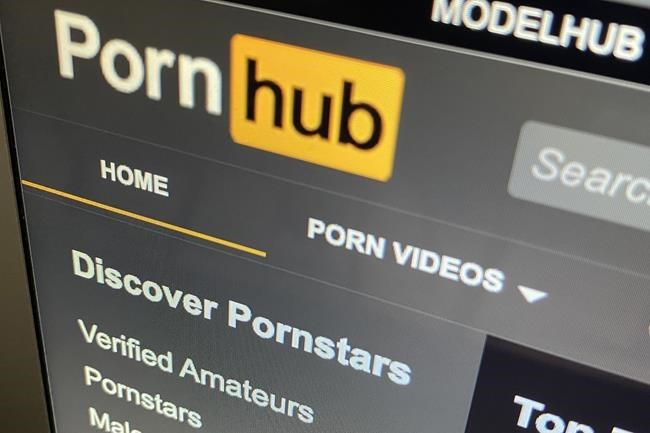OTTAWA — A young woman whose life was shattered by a video of her posted to Pornhub while she was still in middle school says the trauma of child pornography is unending, and that stricter rules are needed.
Serena Fleites told a parliamentary committee Monday that she fell into a spiral of depression, drug use and self-harm after relenting to her boyfriend's demands she send him a naked video of herself in Grade 7 that ended up on the website Pornhub, material that has proven impossible to scrub from the internet.
"A lot of people in the grades above me — mostly guys — they would try to harass me and blackmail me, saying if I didn’t do stuff with them or I didn’t send more videos to them, then they would send it to my family: my grandma, my mom, my sisters, my brother," said Fleites, who is now 19 years old.
The California resident says Pornhub took more than a week to respond to her initial request to take down the video, and weeks more to actually remove it, only to let it to surface again days later, a traumatic process that played out repeatedly.
"It had already been downloaded by people all across the world basically, and it would always be uploaded over and over and over again. No matter how many times I got it taken down, it’d be right up again," she said, blaming Pornhub in particular.
"They’re really selfish. They need to really look at themselves in the mirror, because they’re prioritizing money and content over actual human beings’ lives."
Fleites's lawyer Michael Bowe says she is one of many women who have had exploitive material of them as underage children posted to the Montreal-based streaming giant, or who were sexually assaulted or trafficked with accompanying pornographic videos, which Pornhub's parent company MindGeek denies.
The testimonies come as MPs on the House of Commons ethics committee weigh concerns around privacy and streaming platforms such as Pornhub.
MPs have also called on MindGeek CEO Feras Antoon and chief operating officer David Tassillo to come before the committee and answer whether they plan to make reparations for "the company's failure to prohibit rape videos and other illegal content from its site," according to a committee motion in December. The committee clerk confirmed Monday they are set to appear Friday.
The meeting Monday followed a class-action case launched in Quebec by an Ontario resident that alleges MindGeek — legally headquartered in Luxembourg, but with its main office in a nondescript glass building along a sunken highway in Montreal — has profited off material showing child sexual abuse and non-consensual activity since 2007.
Pornhub says it has removed all videos uploaded by non-verified users after the adult website faced accusations it hosted illegal content.
The move came after Visa and MasterCard launched investigations and decided in December to stop allowing their cards to be used on Pornhub.
A New York Times investigation published that month says the site hosted videos of child sexual assaults and exploitations.
MindGeek and Pornhub did not respond to requests for comment Monday.
The ethics committee is planning to submit a report with findings and recommendations to Parliament in the coming months.
Pornhub gained attention early in the COVID-19 pandemic for seeing visitor numbers soar, and played up its popularity by making premium content free as it climbed even higher on the list of most visited sites — currently No. 11, according to one ranking.
At the committee meeting, Bowe argued that cases like Fleites's comprised an integral part a business model that attracted several billion ad impressions per day as MindGeek made "a knowing decision to commercialize this type of conduct."
"Instead of acknowledging the problem and aggressively dealing with it, what it has aggressively done is conducted a gaslighting campaign in the media and social media to discredit victims and deflect from the issue, and blame it on other things," he said.
When Fleites asked Pornhub to take down her video, the company demanded multiple pieces of ID, "just dragging out the process so long even though it was very obvious it was a child in the video," she said.
"It was bringing them ad revenue and clicks to their site," she said.
"It amazes me how they continued to do that even after hearing that so many other people went through this."
This report by The Canadian Press was first published Feb. 1, 2021.
Christopher Reynolds, The Canadian Press



